留学利弊6篇
出国留学的好处及坏处有哪些

出国留学的好处及坏处有哪些在新的国家生活能让你体验一个跟自己国家差异很多的异国文化和生活习性。
在这里你可以体验不同的食物,欣赏与众不同的音乐。
在你出国留学的学校里学到的东西可以陪伴你一生。
二.结交很多新朋友在留学的学校里可以结识许许多多新朋友。
这可以让你体验到一个独特的经历,有些友情可以陪伴一生,在你回国想出去旅游你可以找你的朋友们一起。
三.学习新的语言如果你出国留学你的国外语言就不会有短板了,在国外你要和当地人聊天交谈,会让你的语言说的越来越流畅。
出国留学的坏处一.乡愁在外面会让你很想自己的家人和故乡,如果你要出国留学就必须忍受这些。
二.孤独刚到国外你没有朋友会很孤独没有人帮助你,如果你很内向就要做好心理准备。
三.适应新的环境当你到新的地方学习都要适应新的环境如果适应不了新的环境那么你在外面很会很难受,而且在国外的生活模式跟国内不一样。
第一次出国的注意事项一、如何保管护照、身份证和国际机票1. 登机时,护照、身份证及机票应随身携带。
2. 住宿酒店时,切勿将其放在房间,应放入酒店保险柜或随身携带。
为以防万一,最好将其复印一份带在身上,有利于证件的补办。
二、如何避免误机最好的办法是尽可能提前赶到机场,特别是交通高峰期,更应提前。
一般国内航班应至少提前2个小时,国际航班应至少提前3小时抵达机场。
如客人乘坐美国西北航空公司的飞机,则要求提前3个半小时抵达机场。
三、保管贵重物品注意事项1.登机时,贵重物品应随身携带,勿放入托运行李中。
2.托运行李时,应将拉链拉好,如有锁应尽量上锁。
最好在行李上粘上自己的铭牌,写明航班、电话、姓名等,便于查找。
3.入住酒店后,应将贵重物品存入酒店保险箱,切勿放在房间行李中。
四、如何办理国际机票再确认手续请至少于后续航班起飞前72小时打电话到当地航空公司或到其办事处确认后续航班机位,以免被取消。
五、在境外兑换外币注意事项1. 请保留好当初兑换当地货币时的单据,以免离境换回时有麻烦。
出国留学有什么坏处
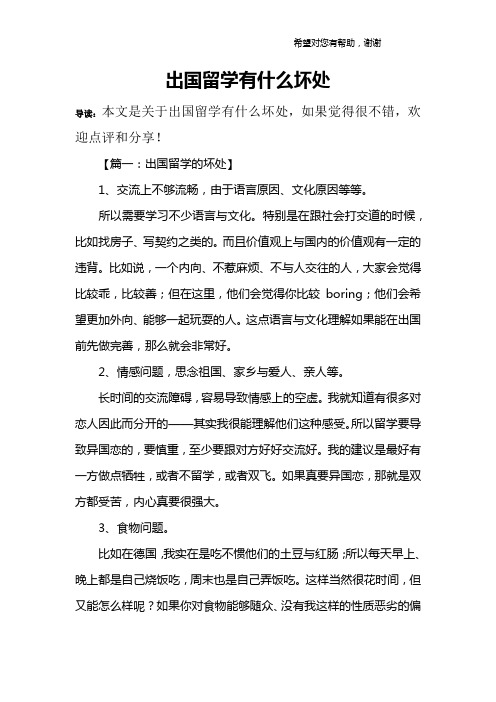
出国留学有什么坏处导读:本文是关于出国留学有什么坏处,如果觉得很不错,欢迎点评和分享!【篇一:出国留学的坏处】1、交流上不够流畅,由于语言原因、文化原因等等。
所以需要学习不少语言与文化。
特别是在跟社会打交道的时候,比如找房子、写契约之类的。
而且价值观上与国内的价值观有一定的违背。
比如说,一个内向、不惹麻烦、不与人交往的人,大家会觉得比较乖,比较善;但在这里,他们会觉得你比较boring;他们会希望更加外向、能够一起玩耍的人。
这点语言与文化理解如果能在出国前先做完善,那么就会非常好。
2、情感问题,思念祖国、家乡与爱人、亲人等。
长时间的交流障碍,容易导致情感上的空虚。
我就知道有很多对恋人因此而分开的——其实我很能理解他们这种感受。
所以留学要导致异国恋的,要慎重,至少要跟对方好好交流好。
我的建议是最好有一方做点牺牲,或者不留学,或者双飞。
如果真要异国恋,那就是双方都受苦,内心真要很强大。
3、食物问题。
比如在德国,我实在是吃不惯他们的土豆与红肠;所以每天早上、晚上都是自己烧饭吃,周末也是自己弄饭吃。
这样当然很花时间,但又能怎么样呢?如果你对食物能够随众、没有我这样的性质恶劣的偏好,你会比我顺利很多。
4、其它。
其实上面所说的好几点,都是双刃剑。
比如学术风气,对有些人来说“艺术般”的学术风气可能会太窝火,对有些人来说可能真的是受益匪浅、非常享用,学到很多真实的学问。
又比如生活自理,对某些人来说可能是学习独立与自主的好平台,而有些人就恨不得食堂一辈子养着他/她。
所以,对这些利弊的权衡,还是要按照个人的实际情况好好考虑。
我这里只是提供一个我的参考。
【篇二:出国留学的坏处都有哪些】出国留学的坏处1、留学是一种选择,也是一次在教育上的投资,那么换个角度其实也是一种**。
赌注是你的青春、父母的期待以及留学经费。
虽然学生年龄还小,输得起,但是谁也不希望孩子落后于同龄学生。
所以带着一家人期望的孩子会感到很大的压力。
所以,如果有留学的想法,学生和家长都需要有一个良好的心态,并能够为自己的决定做最大的努力。
出国留学的利弊留学利弊总结
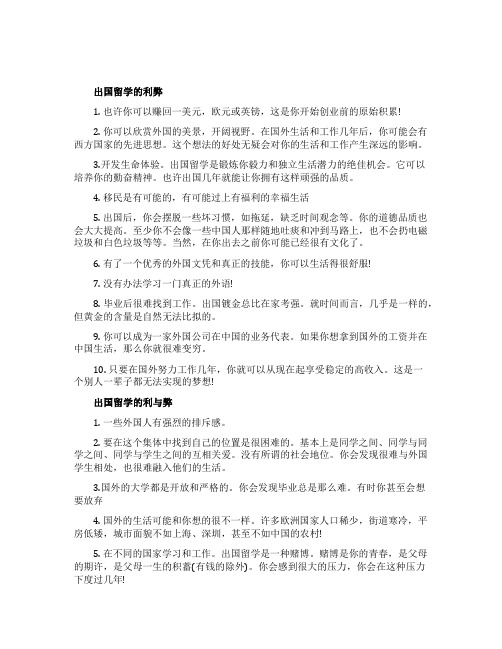
出国留学的利弊1. 也许你可以赚回一美元,欧元或英镑,这是你开始创业前的原始积累!2. 你可以欣赏外国的美景,开阔视野。
在国外生活和工作几年后,你可能会有西方国家的先进思想。
这个想法的好处无疑会对你的生活和工作产生深远的影响。
3.开发生命体验。
出国留学是锻炼你毅力和独立生活潜力的绝佳机会。
它可以培养你的勤奋精神。
也许出国几年就能让你拥有这样顽强的品质。
4. 移民是有可能的,有可能过上有福利的幸福生活5. 出国后,你会摆脱一些坏习惯,如拖延,缺乏时间观念等。
你的道德品质也会大大提高。
至少你不会像一些中国人那样随地吐痰和冲到马路上,也不会扔电磁垃圾和白色垃圾等等。
当然,在你出去之前你可能已经很有文化了。
6. 有了一个优秀的外国文凭和真正的技能,你可以生活得很舒服!7. 没有办法学习一门真正的外语!8. 毕业后很难找到工作。
出国镀金总比在家考强。
就时间而言,几乎是一样的,但黄金的含量是自然无法比拟的。
9. 你可以成为一家外国公司在中国的业务代表。
如果你想拿到国外的工资并在中国生活,那么你就很难变穷。
10. 只要在国外努力工作几年,你就可以从现在起享受稳定的高收入。
这是一个别人一辈子都无法实现的梦想!出国留学的利与弊1. 一些外国人有强烈的排斥感。
2. 要在这个集体中找到自己的位置是很困难的。
基本上是同学之间、同学与同学之间、同学与学生之间的互相关爱。
没有所谓的社会地位。
你会发现很难与外国学生相处,也很难融入他们的生活。
3.国外的大学都是开放和严格的。
你会发现毕业总是那么难。
有时你甚至会想要放弃4. 国外的生活可能和你想的很不一样。
许多欧洲国家人口稀少,街道寒冷,平房低矮,城市面貌不如上海、深圳,甚至不如中国的农村!5. 在不同的国家学习和工作。
出国留学是一种赌博。
赌博是你的青春,是父母的期许,是父母一生的积蓄(有钱的除外)。
你会感到很大的压力,你会在这种压力下度过几年!6. 生活习惯无处不在7. 国外的高消费常常使你感到害羞。
留学新加坡的利弊英文作文

留学新加坡的利弊英文作文下载温馨提示:该文档是我店铺精心编制而成,希望大家下载以后,能够帮助大家解决实际的问题。
文档下载后可定制随意修改,请根据实际需要进行相应的调整和使用,谢谢!并且,本店铺为大家提供各种各样类型的实用资料,如教育随笔、日记赏析、句子摘抄、古诗大全、经典美文、话题作文、工作总结、词语解析、文案摘录、其他资料等等,如想了解不同资料格式和写法,敬请关注!Download tips: This document is carefully compiled by theeditor. I hope that after you download them,they can help yousolve practical problems. The document can be customized andmodified after downloading,please adjust and use it according toactual needs, thank you!In addition, our shop provides you with various types ofpractical materials,such as educational essays, diaryappreciation,sentence excerpts,ancient poems,classic articles,topic composition,work summary,word parsing,copyexcerpts,other materials and so on,want to know different data formats andwriting methods,please pay attention!Living and studying in Singapore has its pros and cons. On one hand, Singapore offers a vibrant and multicultural environment that exposes students to a diverse range of cultures and perspectives. This can greatly enrich their learning experience and broaden their horizons. Additionally, Singapore is known for its excellent education system, with top-notch universities and schools that provide high-quality education and ample opportunities for personal and academic growth.However, there are also some drawbacks to studying in Singapore. One major disadvantage is the high cost of living. Singapore is known for being one of the most expensive cities in the world, with high prices for accommodation, food, and transportation. This can put a strain on students' finances and make it difficult for them to afford a comfortable lifestyle. Moreover, the competitive nature of the education system in Singapore can be quite stressful for students. The pressure to excelacademically and achieve high grades can be overwhelming and may lead to burnout or mental health issues.Another disadvantage is the limited job opportunities for international students after graduation. While Singapore is a thriving business hub, the job market can be quite competitive, especially for foreigners. Companies often prioritize hiring local talent, which can make it challenging for international students to secure employment in their desired field. This can be a major concern for students who hope to find work in Singapore after completing their studies.Furthermore, the weather in Singapore can be a downside for some students. The tropical climate with high humidity and frequent rain showers can be uncomfortable and make it difficult to adjust, especially for those who come from cooler climates. The constant heat and humidity can also affect students' overall well-being and productivity.Despite these challenges, studying in Singapore canstill be a rewarding experience. The opportunity to immerseoneself in a different culture and gain a global perspective is invaluable. The quality education and exposure to a multicultural society can provide students with a competitive edge in the global job market. Additionally, Singapore's strategic location in Southeast Asia offers students the chance to explore neighboring countries and experience different cultures and traditions.In conclusion, studying in Singapore has its advantages and disadvantages. While it offers a multicultural environment and excellent education system, the high cost of living, competitive job market, and challenging weather can be drawbacks. However, with the right mindset and preparation, students can make the most out of their experience and reap the benefits of studying in Singapore.。
出国留学利弊辩论稿
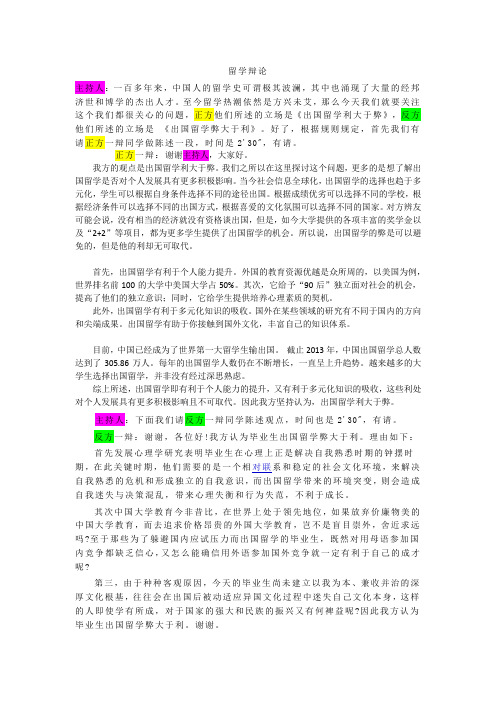
留学辩论主持人:一百多年来,中国人的留学史可谓极其波澜,其中也涌现了大量的经邦济世和博学的杰出人才。
至今留学热潮依然是方兴未艾,那么今天我们就要关注这个我们都很关心的问题,正方他们所述的立场是《出国留学利大于弊》,反方他们所述的立场是《出国留学弊大于利》。
好了,根据规则规定,首先我们有请正方一辩同学做陈述一段,时间是2'30",有请。
正方一辩:谢谢主持人,大家好。
我方的观点是出国留学利大于弊。
我们之所以在这里探讨这个问题,更多的是想了解出国留学是否对个人发展具有更多积极影响。
当今社会信息全球化,出国留学的选择也趋于多元化,学生可以根据自身条件选择不同的途径出国。
根据成绩优劣可以选择不同的学校,根据经济条件可以选择不同的出国方式,根据喜爱的文化氛围可以选择不同的国家。
对方辨友可能会说,没有相当的经济就没有资格谈出国,但是,如今大学提供的各项丰富的奖学金以及“2+2”等项目,都为更多学生提供了出国留学的机会。
所以说,出国留学的弊是可以避免的,但是他的利却无可取代。
首先,出国留学有利于个人能力提升。
外国的教育资源优越是众所周的,以美国为例,世界排名前100的大学中美国大学占50%。
其次,它给予“90后”独立面对社会的机会,提高了他们的独立意识;同时,它给学生提供培养心理素质的契机。
此外,出国留学有利于多元化知识的吸收。
国外在某些领域的研究有不同于国内的方向和尖端成果。
出国留学有助于你接触到国外文化,丰富自己的知识体系。
目前,中国已经成为了世界第一大留学生输出国。
截止2013年,中国出国留学总人数达到了305.86万人。
每年的出国留学人数仍在不断增长,一直呈上升趋势。
越来越多的大学生选择出国留学,并非没有经过深思熟虑。
综上所述,出国留学即有利于个人能力的提升,又有利于多元化知识的吸收,这些利处对个人发展具有更多积极影响且不可取代。
因此我方坚持认为,出国留学利大于弊。
主持人:下面我们请反方一辩同学陈述观点,时间也是2'30",有请。
出国留学的好处和坏处英语作文80词
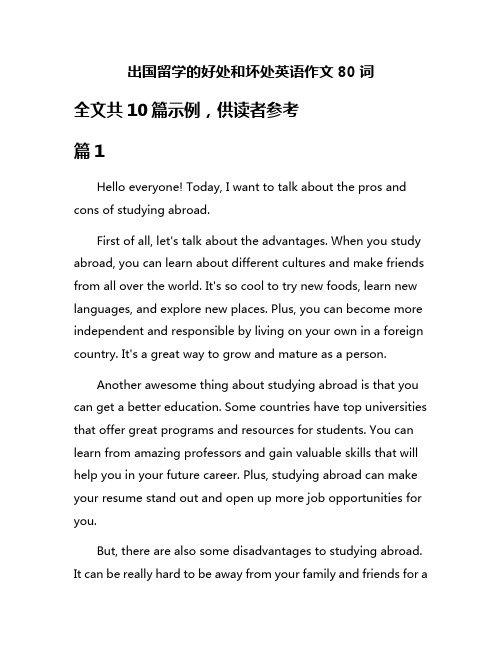
出国留学的好处和坏处英语作文80词全文共10篇示例,供读者参考篇1Hello everyone! Today, I want to talk about the pros and cons of studying abroad.First of all, let's talk about the advantages. When you study abroad, you can learn about different cultures and make friends from all over the world. It's so cool to try new foods, learn new languages, and explore new places. Plus, you can become more independent and responsible by living on your own in a foreign country. It's a great way to grow and mature as a person.Another awesome thing about studying abroad is that you can get a better education. Some countries have top universities that offer great programs and resources for students. You can learn from amazing professors and gain valuable skills that will help you in your future career. Plus, studying abroad can make your resume stand out and open up more job opportunities for you.But, there are also some disadvantages to studying abroad. It can be really hard to be away from your family and friends for along time. You might feel homesick and lonely, especially if you don't speak the language or understand the culture. It can also be expensive to study abroad, with tuition fees, living costs, and travel expenses adding up quickly.In conclusion, studying abroad has its good and bad sides. It's an amazing experience that can enrich your life in so many ways, but it also comes with challenges that you have to overcome. If you're thinking about studying abroad, make sure to weigh the pros and cons carefully and be prepared for the journey ahead. Good luck!篇2Going abroad for studying is super cool! I heard that there are both good things and bad things about it. Let me tell you more about it!First of all, the good things. One awesome thing is that you can learn about a new culture. You get to see different ways of living, try new foods, and meet new friends from all over the world. How cool is that! Plus, you can improve your language skills. Imagine being able to speak a new language fluently - that's so cool!Another good thing is that you can get a better education. Some countries have really good schools and universities, so you can learn a lot and get a top-notch education. And let's not forget about the amazing experiences you'll have. Traveling, exploring new places, and making memories that will last a lifetime. It's like a big adventure!But there are also some not-so-good things about studying abroad. One thing is that you might get homesick. Being away from family and friends can be tough sometimes. And you might also face some challenges, like not understanding the language or feeling lost in a new place. It can be scary, but you'll get through it!Another downside is the cost. Going abroad for studying can be expensive. You'll need to pay for tuition, accommodation, food, and all kinds of other stuff. It can be a lot of money, but it's worth it for the experience and education you'll get.So, there you have it - the good and bad things about studying abroad. It might have some challenges, but in the end, it's totally worth it for all the amazing experiences and opportunities you'll have. So, if you ever get the chance to go abroad for studying, go for it! You won't regret it!篇3Going abroad to study is so cool, right? You get to see new places, meet new people, and learn new things. But, like everything, there are good things and bad things about it.First, let's talk about the good things. One big benefit of studying abroad is that you can learn a new language. Imagine being able to speak Spanish in Spain or French in France! It's like you have a superpower. Plus, you get to experience a different culture. You can try new foods, listen to different music, and celebrate different holidays. It's like going on a never-ending adventure.Another good thing about studying abroad is that you can make new friends from all over the world. You'll meet people who have different backgrounds and perspectives than you, and you'll learn so much from them. Plus, having friends in different countries means you always have a place to stay when you travel.But, studying abroad also has its challenges. One downside is that you might feel homesick. Being away from your family and friends can be hard, especially if you're in a country where you don't speak the language fluently. You might miss your mom's cooking or your dog's cuddles.Another challenge is that studying abroad can be expensive. You have to pay for tuition, housing, food, and travel. Plus, you might have to buy new clothes or things for your dorm room. It all adds up, and you might have to get a part-time job to help cover the costs.Overall, studying abroad is an amazing experience that can help you grow and learn in new ways. Just remember to pack your sense of adventure and your favorite stuffed animal to keep you company. Who knows what amazing things you'll discover out there in the big wide world!篇4Going to study abroad can be really cool, but there are good things and bad things about it. Let me tell you all about it!One of the best things about studying abroad is that you can learn about different countries and cultures. It’s like going on a super fun adventure! You can make friends from all over the world and try all kinds of yummy foods. Plus, you can learn a new language and become super smart!Another cool thing is that you can see amazing sights and famous landmarks. Imagine seeing the Eiffel Tower in Paris or theGreat Wall of China! It’s so exciting to explore new places and take cool pictures for your Instagram.But there are also some not-so-great things about studying abroad. One of the bad things is that you might feel homesick. You’ll miss your family, friends, and your favorite foods. It can be tough to be away from home for a long time.Also, studying abroad can be expensive. You have to pay for things like tuition, housing, food, and travel. It can be a big financial burden on you or your family. Plus, you might have to deal with currency exchange rates and budgeting your money.Overall, studying abroad can be an amazing experience with lots of benefits. Just remember to be prepared for some challenges along the way. Have fun, be safe, and make the most of your time studying in another country!篇5Going abroad to study is totally cool because you get to experience a whole new country, make new friends, and learn about different cultures. It's like a big adventure! Plus, you get to improve your English skills and become more independent.One really good thing about studying abroad is that you can learn about different cultures and traditions. For example, you might celebrate holidays that you've never heard of before or try new foods that you never knew existed. It's really interesting to see how people in other countries live and what they like to do for fun.Another awesome thing is making new friends from all over the world. You can meet people from different backgrounds and learn about their lives. You might even make lifelong friends who you can visit in the future or keep in touch with online. It's so cool to have friends from all over the world!But studying abroad isn't all rainbows and unicorns. There are some challenges too. For one thing, it can be really hard to be away from your family and friends back home. You might miss them a lot and feel lonely at times. It's important to stay in touch with them and talk about your feelings.Also, studying in a different country can be tough because you have to adapt to a new education system and maybe even a new language. It can be confusing at first, but with time and practice, you'll get the hang of it. Just stay positive and keep trying your best.Overall, going abroad to study is a great experience that can help you grow as a person and open your eyes to new possibilities. So if you ever get the chance to study abroad, don't hesitate – go for it! You won't regret it.篇6Going abroad to study has both good and bad sides. Let's first talk about the good things!One of the best things about studying abroad is that we can learn new things and expand our horizons. We can experience different cultures, meet new people, and try new foods. It's so exciting to explore a whole new country!Another good thing is that we can improve our language skills. By studying in a foreign country, we can immerse ourselves in the language and practice speaking it every day. This can really help us become fluent in a new language.Also, studying abroad can help us build our independence and confidence. We have to navigate a new city, make new friends, and take care of ourselves. It can be challenging, but it's also a great opportunity to grow and learn to rely on ourselves.Now, let's talk about the not-so-good things about studying abroad.One downside is that it can be expensive. We have to pay for tuition, housing, food, and travel expenses. It can be a lot of money, and not everyone can afford it. We also have to be careful about our budget and be responsible with our spending.Another downside is that we might feel homesick. We miss our family and friends, our favorite foods, and our familiar surroundings. It can be hard to adjust to a new country and culture, and we might feel lonely or out of place.Overall, studying abroad can be a great experience, but it also comes with challenges. It's important to weigh the pros and cons before making the decision to go overseas for school.篇7Going to study abroad has both good and bad sides. Let me tell you all about it!First of all, the good things about studying in another country are so exciting. You get to see new places, try new foods, and make friends from all over the world. It's like a big adventure! And you can learn a new language, which is super cool. Plus, youcan study at a great school and maybe even get a better job in the future. How awesome is that?But there are also some not-so-great things about going to study abroad. You might feel homesick and miss your family and friends. And it can be hard to get used to a new country with different customs and ways of doing things. Sometimes, the classes might be really tough and you have to work extra hard to keep up. And oh, the time difference can make it tricky to talk to people back home. It's a lot to handle!Overall, going to study abroad is a big decision and it has its ups and downs. But it's definitely worth it for all the amazing experiences and opportunities you'll have. Just remember to stay positive, work hard, and enjoy the journey. Who knows, you might even find your new favorite place in the world!篇8Going to study abroad sounds super cool, right? But why are some people saying it’s good, while others say it’s bad? Let’s take a look at the pros and cons of studying abroad!First, let’s talk about the good stuff. One big benefit is that you can learn a new language. Isn’t that awesome? You can talk to people in a different language and understand their culturebetter. It’s like going on an adventure every day! Yo u also get to make new friends from all over the world. How cool is that? You can learn about different cultures and traditions, and maybe even try out some new food.Another good thing about studying abroad is that you can get a better education. Some countries have really good schools and programs that can help you learn more and become smarter. Plus, it looks super cool on your resume when you’re looking for a job.But wait, there are also some not-so-good things about studying abroad. One downside is that you might feel homesick. You’ll miss your family, friends, and all the things that make you feel cozy and happy. It can be tough being away from home, especially if you’re in a new place where everything feels different.Another downside is that studying abroad can be expensive. You’ll need to pay for tuition, housing, food, and all the other things you need to live. It can be a big financial burden, especially if you’re not able to work while you study abroad.So, as you can see, there are both good and bad things about studying abroad. It’s important to think about your own feelings and situation before deciding if it’s right for you. Justremember to have fun, be safe, and make the most of your experience!篇9Going to study abroad is super cool beans! You get to learn about different cultures, meet new friends from all over the world, and improve your language skills. But, there are also some not-so-great things about studying abroad. Let me tell you all about it!First off, one of the best things about studying abroad is that you get to immerse yourself in a new culture. You can try new foods, visit historical sites, and learn about traditions that are different from your own. It's like going on a super exciting adventure every day!Another awesome thing about studying abroad is making new friends. You get to meet people from all over the world who have different backgrounds and perspectives. It's so cool to learn from them and share your own experiences. Plus, you can make lifelong friendships that will last even after you go back home.Studying abroad also helps you improve your language skills. Whether you're studying in an English-speaking country or practicing a new language, you'll become more fluent andconfident in communicating with others. This can open up so many opportunities for you in the future, both professionally and personally.Now, let's talk about some of the not-so-great things about studying abroad. One downside is that you might feel homesick at times. It can be tough being far away from your family and friends, especially during holidays or special occasions. But, remember that it's okay to feel homesick, and there are always ways to stay connected with your loved ones.Another challenge of studying abroad is dealing with culture shock. You might encounter customs or values that are different from what you're used to, which can be confusing or overwhelming. But, try to keep an open mind and embrace the new experiences. It's all part of the learning process!Lastly, studying abroad can be expensive. From tuition fees to living expenses, you'll need to budget carefully and plan ahead to make sure you can afford it. But, don't let money be a barrier to your dreams - there are scholarships and financial aid options available to help you cover costs.In conclusion, studying abroad has both its advantages and challenges. It's an amazing opportunity to explore the world, make new friends, and improve yourself in so many ways. So, ifyou're thinking about studying abroad, go for it! It's an experience you'll never forget.篇10Going abroad to study can be super cool! There are lots of good things about it, like getting to see new places, making new friends, and learning a different language. But there are also some not-so-great things, like being far away from your family and feeling homesick.One of the best things about studying abroad is being able to experience a different culture. You get to try new foods, learn about different traditions, and see amazing sights. It's like going on a big adventure! Plus, you can meet people from all over the world and make friends that you'll have forever.Another awesome thing about studying abroad is getting to learn a new language. It can be challenging at first, but it's so rewarding when you start to understand and speak it fluently. Plus, speaking more than one language can open up lots of opportunities for you in the future.But there are also some tough things about studying abroad. You might feel lonely sometimes, especially if you're far away from your family and friends. It can be hard to adjust to a newschool, new customs, and a new way of life. And sometimes you might miss your home and wish you were back there.Overall, studying abroad has its ups and downs. It's a great way to learn and grow, but it can also be challenging at times. Just remember to stay positive, be open to new experiences, and enjoy the adventure!。
study abroad advantages disadvantages

study abroad advantagesdisadvantages出国留学的利弊出国留学是一个具有挑战性和有益的经历,但也有一些潜在的缺点。
以下是出国留学的一些优点和缺点:优点:1. 丰富的学术和文化体验:出国留学可以让你接触到不同的教育体系和学术氛围,拓宽你的学术视野。
你还将有机会深入了解其他文化,培养跨文化交流能力。
2. 语言学习机会:生活在国外的语言环境中,能帮助你更快速、更有效地学习一门新语言。
这不仅对你的学术和职业发展有益,还能增强你的跨文化交际能力。
3. 国际人脉和职业机会:通过与来自世界各地的学生和教师交流,你将建立广泛的国际人脉。
这些联系可能对你未来的职业发展产生积极影响。
4. 独立和自我成长:在异国他乡生活和学习需要很强的适应能力和独立性。
这是一个培养自我管理、解决问题和应对挑战能力的好机会。
缺点:1. 文化冲击和适应困难:适应新的文化、习俗和生活方式可能是一个具有挑战性的过程。
文化冲击可能导致思乡、孤独和心理压力。
2. 高昂的费用:出国留学可能需要支付高昂的学费、生活费用和旅行费用。
这可能对一些家庭的经济造成负担。
3. 学业压力和适应新教育体系:在国外学习可能需要适应不同的教育体系和教学方法,这可能给你的学业带来额外的压力。
4. 家庭和社交分离:长时间远离家乡和亲人可能导致社交隔离和家庭分离,这可能对一些人造成困扰。
综上所述,出国留学有许多优点,但也存在一些缺点。
在决定是否出国留学时,需要仔细权衡利弊,并考虑个人的目标、财务状况和适应能力。
对于那些有决心和准备充分的人来说,出国留学可以是一次丰富多彩、有益于个人成长的经历。
留学新加坡的利弊英文作文
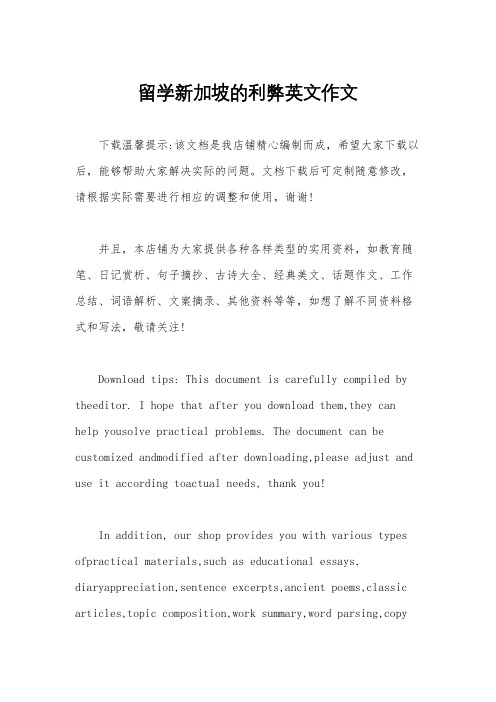
留学新加坡的利弊英文作文下载温馨提示:该文档是我店铺精心编制而成,希望大家下载以后,能够帮助大家解决实际的问题。
文档下载后可定制随意修改,请根据实际需要进行相应的调整和使用,谢谢!并且,本店铺为大家提供各种各样类型的实用资料,如教育随笔、日记赏析、句子摘抄、古诗大全、经典美文、话题作文、工作总结、词语解析、文案摘录、其他资料等等,如想了解不同资料格式和写法,敬请关注!Download tips: This document is carefully compiled by theeditor. I hope that after you download them,they can help yousolve practical problems. The document can be customized andmodified after downloading,please adjust and use it according toactual needs, thank you!In addition, our shop provides you with various types ofpractical materials,such as educational essays, diaryappreciation,sentence excerpts,ancient poems,classic articles,topic composition,work summary,word parsing,copyexcerpts,other materials and so on,want to know different data formats andwriting methods,please pay attention!Studying in Singapore has both advantages and disadvantages. On one hand, studying in Singapore offers a unique cultural experience. The country is a melting pot of different cultures and ethnicities, providing students with the opportunity to interact with people from diverse backgrounds. This exposure can broaden their horizons and enhance their understanding of different cultures.On the other hand, studying in Singapore can be expensive. The cost of living in Singapore is relatively high, and tuition fees for international students can be quite steep. This can put a financial strain on students and their families, making it difficult for them to afford their education and cover their living expenses.Additionally, studying in Singapore can be academically challenging. The education system in Singapore is known for its high standards and rigorous curriculum. Students are expected to work hard and excel in their studies. This canbe a source of pressure and stress for some students, especially those who are not used to such demanding academic expectations.However, studying in Singapore also offers excellent educational opportunities. The country is home to prestigious universities and institutions that provide quality education. Students can benefit from the expertise of experienced professors and access state-of-the-art facilities. This can greatly enhance their learning experience and equip them with valuable knowledge and skills.Moreover, studying in Singapore can open up career opportunities. The country has a thriving economy and is a hub for various industries. This means that students have access to internships and job opportunities in sectors such as finance, technology, and hospitality. This can give them a competitive edge in the job market and increase their chances of securing a good job after graduation.Despite these advantages, studying in Singapore mayalso have some disadvantages. For instance, some students may find it challenging to adapt to the fast-paced and competitive environment. The pressure to perform well academically and the intense competition among students can be overwhelming for some individuals.In conclusion, studying in Singapore has its pros and cons. It offers a multicultural experience, excellent educational opportunities, and potential career prospects. However, it can be expensive, academically challenging, and may create pressure for students. Ultimately, the decision to study in Singapore should be based on individual preferences, goals, and financial considerations.。
- 1、下载文档前请自行甄别文档内容的完整性,平台不提供额外的编辑、内容补充、找答案等附加服务。
- 2、"仅部分预览"的文档,不可在线预览部分如存在完整性等问题,可反馈申请退款(可完整预览的文档不适用该条件!)。
- 3、如文档侵犯您的权益,请联系客服反馈,我们会尽快为您处理(人工客服工作时间:9:00-18:30)。
留学利弊6篇【篇一:出国留学的利弊总结】近年来,国内就业形势一直保持着严峻态势,很多同学都期望通过出国留学来提高自身价值,然而当时一度颇受欢迎的“海归”也渐渐变成了“海待”,所以很多同学在是否出国的选择上也变得比较迷茫。
今天就为大家整理了出国留学的几大利与弊,希望能对大家有所帮助。
一、出国留学的利1、学习英语语言的学习对环境的依赖性很强,在全英文的我生活环境中可以很好地锻炼自己的英文能力,出国留学生活一段时间后,个人的英文能力会有良好的提升空间2、对自我能力的提升选择出国留学,可以很好地锻炼自己的个人能力,在异国他乡,所有的事情都要靠自己解决。
留学会让你学会更加独立。
你要自己租房子,自己弄饭吃。
不像在国内的时候,大众食堂保证你的生活。
所以在留学期间,能够有更多的独立自主性,无论是对留学生的生活能力、理财能力还是交际能力都是不错的锻炼机会。
3、工作机会回国后更容易找到工作。
尤其是在私企或者外企中,海归的竞争力远高于国内研究生。
4、更方便的移民很多国家都期望通过吸引留学生来增加移民数量,因此提出了很多针对留学生的优惠政策,所有对有移民打算的同学来说,选择留学来实现移民是个捷径。
5、开拓眼界国外和国内无论是生活环境还是人的价值观都有很大的差异,在一个新的环境中生活可以体验全新的风土人情,领略不通风民俗文化,可以开拓个人眼界。
二、出国留学的弊1、交流上不够流畅由于语言原因、文化原因等等。
所以需要学习不少语言与文化。
特别是在跟社会打交道的时候,比如找房子、写契约之类的。
而且价值观上与国内的价值观有一定的违背。
2.费用高出国留学还是需要有一定的经济基础的。
英国现在的硕士一年的整体费用30万上下,澳大利亚和英国差不多,美国加拿大的话,大概是40万左右。
3、诱惑大国外环境相比国内更为开放,也更具诱惑性,自控能力差的同学容易受到不良诱惑,误入歧途。
如果没有学到真正的知识,会白白浪费几年光阴和大笔金钱4、远离亲人出国难免要面临与亲人朋友的分别,孩子年龄都偏小,一下子到异国他乡,难免会特别想念家人,容易觉得特别孤单,不利于孩子心理健康的成长。
【篇二:出国留学利弊】现在出国留学已经呈现出越来越热门的趋势,不管是出国读高中、本科还是研究生,每年有大量的中国学生走出国门,去世界各地留学,但是并不是每个人都适合出国留学,如果不能适应国外的留学生活,根本达不到出国留学的初衷。
那么各个阶段出国留学的利弊各是什么呢?下面一起来看看吧。
1、初中毕业申初中毕业申请国外高中请国外高中优势是非常明显,孩子年龄越小,语言能力接受力强,较快可达到当地人的水平,另外在留学所在国家获得高中学历,对冲刺该国优秀的大学非常有帮助,同时可以免去托福、雅思等英语测试的要求,只凭高中成绩即可申请入学,申请成功的概率较大。
而劣势则是由于孩子年龄较小,会存在一个适应环境能力差、自我约束力薄弱等方面的问题。
初中毕业来国外读书的孩子,最好入住国外家庭,学校一般会尽可能选择国外同学中较好的家庭。
这样,孩子也能更好地体验外国家庭的教育。
从学习上看,国内初中毕业打下了足够好的数理基础。
来国外高中就读,一旦语言过关,就可以马上步入正轨了。
国外高中课程多是选修为主,这样可以充分发挥孩子的个人才能,而决非象国内的高中生那样,只围绕着高考的指挥棒转。
另外,也要看孩子的个性,国外留学大多比较适合那些性格开朗的孩子,尤其是相对适应能力差的低龄学生。
2、高中毕业申高中毕业申请国外本科请国外本科优势是国内的高中教育对一些学科知识打下比较扎实的基础,同时高中毕业的年龄,学生已经基本形成自己的人生观,西方教育课程开设非常齐全,可以满足学生对任何专业的选择需求。
据专家介绍,目前全球最好的本科教育还是在美国,并且最好的学校都是一些私立学校、贵族学校。
而劣势是国内的高中课程比较紧张,孩子除了应付高考课程,还要为出国做准备,如:托付、雅思、SAT、GRE等,对孩子的时间、精力等各方面都是一种考验,存在不少困难。
相对劣势而言,本科留学的优势更加显而易见,这也是为什么近年来本科留学大热的主要原因。
3、大学毕业申请国外硕士优势是学制短,留学时间只需1-2年,花费较少,为多数中国家庭所能负担。
类似澳洲、加拿大这样的传统移民国家来说,研究生学历可以获得更多的移民加分,如果专业再选择为当地较为紧缺的专业的话,则移民的概率较高。
但是劣势是学生年龄较大,人生观较为固定,语言学习能力错过了最佳时间,所以出国留学对于融入当地环境、语言能力提升等方面的效果,远不如前两种方案出色。
同时,研究生学历在海外毕业后的就业几率没有本科毕业高,造成留学后回流的现象居多。
目前,本科毕业生出国留学有三种途径:一是公费留学。
一般来说,公费的研究生每个大学只有很少的名额,如果学生成绩足够优秀,可以推荐公费出国留学的话,可能不会需要花费太多。
二是自费留学,目前90%学生都是选择自费出国留学。
总体而言,目前美国留学费用最高,最低一年费用约在15万-20万元人民币,一般为30万-40万元人民币一年。
其次是英国、澳大利亚等英联邦国家,亚洲地区新加坡、韩国、日本处于中间价位。
三是移民。
目前不少欧美国家均实施高福利政策,外国移民及其子女均可享与本国公民的同等待遇,包括免费或低学费学习。
因此,有些人通过“先移民后留学”的模式出国。
不仅可享受免学费或低学费的福利,在学校和专业选择上也更为宽松。
【篇三:盘点各个阶段选择出国留学的利弊】近些年来,越来越多的学生选择出国留学,包括家长和学生认为出国就是最好的,国外的教育就是最好的,把出国当做逃避中考,高考或者避开国内考研大军的一个路子。
殊不知,出国是要具备一些条件的,包括语言基础,生活自理能力,还有资金条件等。
下面我们盘点各个阶段出国的优劣势。
去国外读高中?去国外读高中,优势很明显,首先就是提高学生的英文能力。
语言环境是语言学习无法取代的极大优势。
在美国私立中学,国际学生可以同英语国家的同学一起生活、学习,这样就形成了一个非常适合学习英语的环境。
很多高中都开设ESL(English as a Second Language)课程,能够帮助国际学生尽快提高英语能力。
其次,学生有充分的机会选择适合自己的大学,所以选择高中比较重视周围大学的资源,所谓近水楼台先得月就是这个道理。
其次,多文化融合的环境开阔学生的眼界,拓宽学生的知识面。
众所周知,美国是个移民国家,所以它能够集各民族的优势于一身,并且具备极大地生命力和开拓进取的精神。
最后也是最重要的一点,美国的高中重视个性化的充分开发。
要发掘每个学生的特点,因材施教。
这里所谓的“教”事实上是一种引导,让学生认识到个人的潜能,并创造机会与环境使这种潜能得以全面的发挥和挖掘。
而劣势则是由于孩子年龄较小,会存在一个适应环境能力差、自我约束力薄弱等方面的问题。
还有一个就是家庭要准备充分的资金。
美国高中一年一年的总开支至少预留25万以上人民币。
最主要的还是孩子的生活自理能力还有语言功底都要把关好,建议在考虑高中读书之前,可以先通过新通的暑期或者寒假的游学项目,先体验下国外的真实的高中学习生活。
国外读本科?高三毕业赴美读本科是自费美国留学的大军。
美国本科考车学生是多元化的。
众所周知,美国中学生的课程很简单,美国本科大学入学测试的难度和水平更是只及中国的初中水平。
但是如此自由轻松的美国大学教育却培养了众多各行各业的天才级大师,如比尔盖茨、沃伦巴菲特等。
我们只知道美国的教育非常重视创造性教育,却不知道他们的教育更重视培养基本的学术思考能力。
除了本科教育学制也是四年之外,中美大学教育存在着本质上的区别.美国本科教育之目标是为了培养健全的个体,使其成为一个称职的文明社会公民;而中国本科教育目标在于培养工具式的人才。
美国的大学教育培养出来的学生在知识宽度、平衡性方面有着显著的优势。
基本的历史、人文和哲学教育能够保证毕业生至少具备基本的现代公民素质。
而对不同领域的广泛而不深入的涉略,能够让毕业生保持对科学的兴趣,从而为研究生阶段进一步深入研究打下基础。
这些,都是我们中国的教育需要好好学习的而劣势是国内的高中课程比较紧张,孩子除了应付高考课程,还要为出国做准备,如:托福或者雅思、SAT或者ACT等,对孩子的时间、精力等各方面都是一种考验,存在不少困难。
特别是想冲刺前30高端,不仅仅是顾及到语言考试,还需要大量的软实力背景提升活动。
相对劣势而言,本科留学的优势更加显而易见,这也是为什么近年来本科留学大热的主要原因。
国外读研?优势是学制短,留学时间只需1-2年,花费较少,为多数中国家庭所能负担。
也是近几年一来大部分工薪阶层孩子选择出国的方式。
美国的研究生教育也是专业和精英教育。
但是劣势是学生年龄较大,人生观较为固定,语言学习能力错过了最佳时间,所以出国留学对于融入当地环境、语言能力提升等方面的效果,远不如前两种方案出色。
目前,本科毕业生出国留学有三种途径:一是公费留学。
一般来说,公费的研究生每个大学只有很少的名额,如果学生成绩足够优秀,可以推荐公费出国留学的话,可能不会需要花费太多。
二是自费留学,目前90%学生都是选择自费出国留学。
总体而言,目前美国留学费用标准,最低一年费用约在15万-20万元人民币,一般为30万-40万元人民币一年。
【篇四:各年龄段出国留学的利弊】“出国留学(课程)要趁早”,那么,到底是不是越早越好呢?对于中国的孩子来说,出国读本科和硕士都是不错的选择。
但是本科一般要读三四年,而硕士一般1-2年就可以了,因此,从费用上来说硕士的性价比是高于本科的。
那么,问题来了,什么年龄是出国留学的最佳时期呢?下面给大家分享一下各年龄段出国留学的利弊。
国内中小学生,出国读高中“好处”年龄小,接受外来文化较快,更容易融入当地的文化环境。
正处于心理成长阶段,较容易接受当地的文化以及思维方式。
在语言学习上有一定的优势相对于国内的学生,日后申请国外大学本科或硕士,有很大优势。
“弊端”年龄偏小,独立性可能会比较弱。
因为思念家人朋友,倍感孤独,产生过大的心理压力,不利于健康身心的成长自制能力较弱,容易受身边朋友的影响。
国内高中生,出国读本科“好处”从年龄来说,基本上已经独立自主了。
(ps:妈宝儿们请自行绕道……)从学习的角度来说,在国内学了这么多年,出国见识一下,接收一下国外思维授课,应该会获益匪浅。
(ps:金牛座不一定,你知道的,牛牛们一辈子都在死守原则和底线……)经过了高考(精品课)的洗(da)礼(ji),心理趋向成熟。
有人统计过,非英语(精品课)专业的学生,高考后的英语水平可能是你一生之中最高的。
这个时候趁热打铁去考雅思(课程)托福(课程),通过率可不是一般的高。
“弊端”因为学期长,一般是4年,少的也要三年,所以学费和生活费会是一笔不小的开销。
